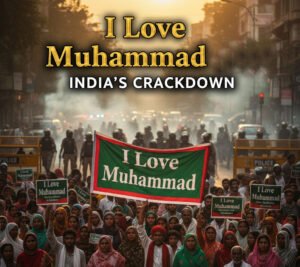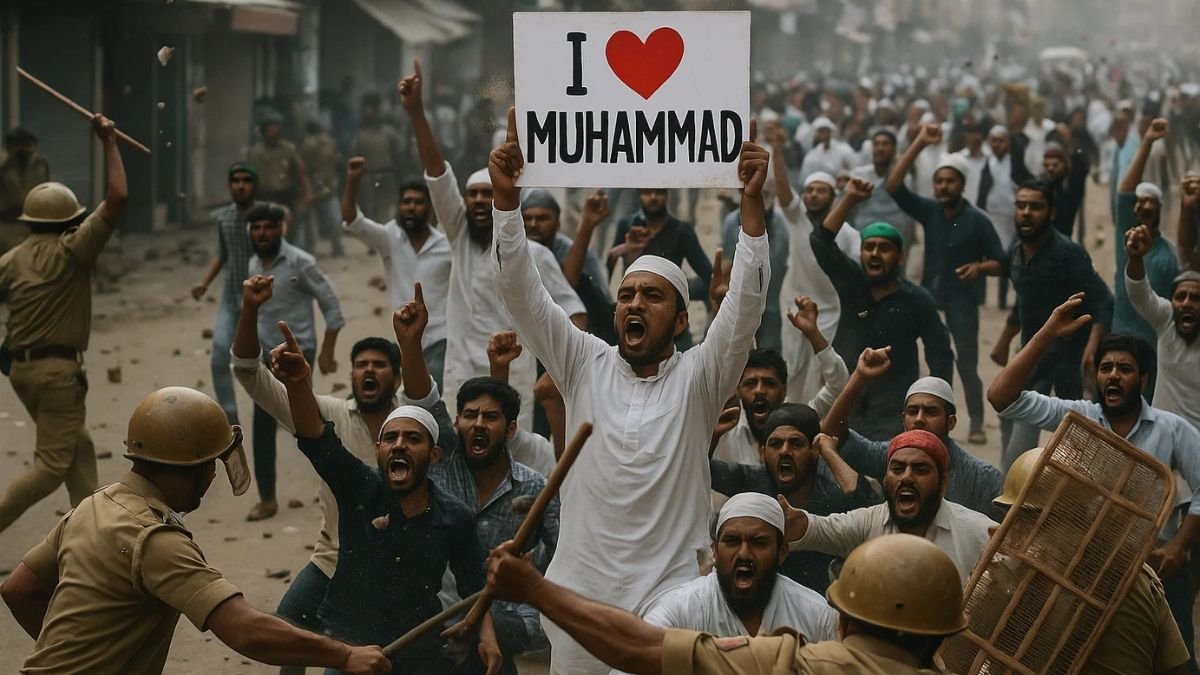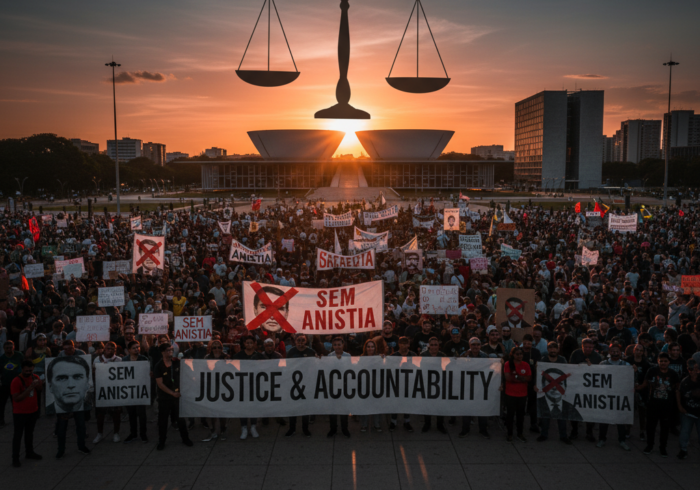A simple phrase of love, “I Love Muhammad (PBUH)”, displayed on banners during the Prophet’s birthday processions has become the latest flashpoint in India’s deepening crisis over religious freedom. What began as a devotional expression during Milad-un-Nabi in Uttar Pradesh has spiraled into a nationwide crackdown: mass arrests, sweeping FIRs, internet shutdowns, and property demolitions.
At the heart of the controversy lies a chilling question, how did an act of faith become a matter of state security?
India’s Islamophobia on Display

The controversy erupted in early September when Muslim processions across northern India displayed “I Love Muhammad” posters to mark Barawafat. Local Hindu groups termed the banners “provocative,” prompting police to file cases and remove posters. What followed was a wave of state action that quickly spread far beyond Uttar Pradesh.
In Meerut, five men were arrested for allegedly putting up a poster in Mawana town, charged under Section 353 of the Bharatiya Nyaya Sanhita for “statements conducing to public mischief.” In Barabanki, when police removed a banner at night, clashes erupted, 8 people were arrested and 159 booked.
According to data compiled by the Association for Protection of Civil Rights (APCR), as of September 23, 21 FIRs had been filed across multiple states, implicating 1,324 Muslims and resulting in 38 arrests. In Uttarakhand’s Kashipur, 401 people were named in one FIR; in Gujarat’s Godhra, 88 were accused and 17 arrested; and Maharashtra recorded multiple arrests for mere display of the phrase.
What unites these cases is the absence of violence and the abundance of criminalization. The slogans were peaceful. The response was anything but.
Bareilly: The Epicenter of a Manufactured Crisis
The epicenter of the crisis lies in Bareilly, a spiritual stronghold of the Barelvi school of Sunni Islam. On September 26, after Friday prayers, thousands gathered carrying “I Love Muhammad” banners, an annual practice in the city. When police sought to restrict the rally and cleric Maulana Tauqeer Raza Khan called off participation, unrest flared near his residence and a local mosque.
Authorities responded with tear gas, baton charges, and mass detentions. The aftermath was severe:
- 10 FIRs naming 180 identified individuals and 2,500 unnamed persons
- 81 arrests across Bareilly district
- 14-day judicial remand for Maulana Tauqeer Raza Khan and seven aides
- Internet services suspended across the city
- Properties worth ₹150 crore sealed or demolished, including structures linked to Raza’s associates

The police allege protesters injured 21 officers and engaged in stone-pelting; residents contest this, saying the unrest was sparked by provocation and excessive police force.
Bulldozers soon followed. A building known as “Raja Palace,” reportedly connected to Raza’s supporters, was demolished under the pretext of “illegal construction.” The cleric’s family home was sealed, and others were warned of similar action.
For many, the message was unmistakable, collective punishment had replaced lawful investigation.
Selective Enforcement and Double Standards
The pattern of enforcement reveals a dangerous bias. Across multiple states, Muslims displaying “I Love Muhammad” banners have been booked under riot or mischief laws. Yet, Hindu groups conducting counter-demonstrations with slogans like “I Love Ram,” “I Love Yogi,” or “I Love Bulldozer” have faced no comparable action.
In Muzaffarnagar, six men were arrested simply for pasting “I Love Muhammad” posters on houses and vehicles. In contrast, provocative Hindu processional banners in recent months have drawn no FIRs.
Human rights lawyers argue that the mass, unnamed FIRs, sometimes listing hundreds or thousands of “unknown accused”, are designed to intimidate entire communities rather than to pursue individual accountability. This, they say, turns “law and order” into a weapon of communal control.
The Indian American Muslim Council and other diaspora groups have condemned the crackdown as “a systematic campaign to criminalize Muslim identity.” Domestic rights networks call it “collective policing of faith.”
The Political Theatre of “Order”
Observers say the government’s response is less about law and more about optics. Uttar Pradesh Chief Minister Yogi Adityanath publicly declared that “those who stir riots will be taught a lesson.” State officials repeatedly called “I Love Muhammad” a “new tradition”, a phrase used to delegitimize it, despite its long history in processional culture.
The cleric at the centre, Maulana Tauqeer Raza Khan, is a descendant of Ahmed Raza Khan Barelvi, founder of the Barelvi movement. Police allege he mobilized 16,000 people through WhatsApp groups, a claim yet to be substantiated.
Critics argue that the state’s heavy-handedness serves political ends: projecting “decisive governance,” diverting attention from unemployment and inflation, and energizing a majoritarian voter base ahead of key state elections.
By framing Muslim public devotion as a potential riot trigger, authorities effectively criminalize a community’s visibility in public space.
From Rights to Repression: India under Global Scrutiny
Legal and human-rights experts warn that the “I Love Muhammad” crackdown represents a deeper erosion of constitutional rights.
- Due Process Violations: FIRs naming thousands without specific evidence erode the principle of individualized investigation.
- Collective Punishment: Internet shutdowns and property demolitions penalize entire neighborhoods.
- Lack of Transparency: Many detainees remain untraceable; police have not released full lists of those arrested.
- Erosion of Secular Policing: Enforcement now appears identity-based rather than crime-based.
Internationally, India’s image has taken another blow. Diaspora organizations in the U.S. and U.K. have issued condemnations, while rights monitors warn that the criminalization of religious expression undermines New Delhi’s claims of democratic pluralism.
According to rights observers, communal violence in India rose 84% in 2024 compared with the previous year, with Uttar Pradesh ranking among the top three states for such incidents. The “I Love Muhammad” affair, they say, is part of that wider arc, where devotion is reinterpreted as dissent.
The arrests over “I Love Muhammad (PBUH)” are not isolated incidents. They mark a structural shift in how faith, dissent, and identity are governed in today’s India. When an expression of love for the Prophet becomes grounds for incarceration, the state crosses from neutrality into prejudice.





